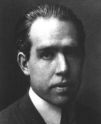|
Yamaha makes a thing called Silent Brass. And yeah, those are technique books. At least Arban's is. I'm not much of a trumpet player but I at least recognize that name.
|
|
|
|

|
| # ? Apr 27, 2024 14:35 |
|
Emory Remington was the long-time trombone prof at Eastman. Remington studies are tone-building exercises. They teach you to maintain a consistent tone across the entire range of the horn. They follow this simple pattern. The goal is to make the transition between notes as smooth as possible, while having the lower note match the tone of the open horn as much as possible. You can start from any partial, including the F below the staff doing the exercise with the 4th valve held down. Variants include returning to the open note after descending, and ascending on the same pattern instead of descending. Vincent Cichowicz played trumpet in the Chicago Symphony for 20-odd years and was trumpet prof at Northwestern. His "Flow Studies" build upon the same concepts while also expanding your range in both directions. Herbert L. Clarke was the cornet soloist for the Sousa band. His studies are THE technical foundation for brass playing. They're a set of exercises that all look something like this:  Each exercise is to be played in one breath at about mezzo piano, and each has detailed instructions on how many times you take the repeat. So every exercise trains not only your raw technique, but also overall lung capacity, air control, tone quality, and articulation (in their vanilla form most studies are to be completely slurred, but Clarke suggests articulation variations for each note grouping and naturally there are countless more). It's a wonderfully holistic approach. Jean-Baptiste Arban's Complete Conservatory Method for Trumpet (affectionately known as The Bible) is exactly what it says on the tin: COMPLETE. The first page is "This is a whole note," and the last page is The Carnival of Goddamn Venice. The original trombone/euphonium adaption was edited by Simone Mantia, euphonium soloist with the Sousa band, while the new revised edition has notes from Brian Bowman and Joe Alessi. You'll find no more knowledge-dense reference for brass playing on the planet. And yes, Silent Brass is an option for practicing without pissing off the neighbors. Non-electronic practice mutes exist as well. All are a bit pricey for euphs, but hey, at least it's not a tuba mute. As for mouthpieces... since you're just coming back to playing, and it sounds like you don't currently own one, I actually kind of think that you won't know what your needs are until you start playing. If you're buying that horn new then it will come with a mouthpiece, I would suggest starting with that and go from there. That said, I've never gone wrong with Denis Wick.
|
|
|
|
I have dropped the G string on my guitar by a semitone and capo'ed on the third to play this lute piece, what a trouble it is giving me (if you don't want to research, A is open string, B is first fret, C is second fret, etc. otherwise is the same as regular tab) http://www.gerbode.net/composers/Bakfark/pdf/czarna_krowa.pdf https://www.youtube.com/watch?v=FndsK_Sm7_8 Great fun to try, though.
|
|
|
|
Mr. Bing posted:Emory Remington was the long-time trombone prof at Eastman. Remington studies are tone-building exercises. They teach you to maintain a consistent tone across the entire range of the horn. They follow this simple pattern. Thank you very much for all this awesome info, I feel with these resources, your advice, and getting a teacher once I've exhausted my tiny latent unpracticed potential, I'll be off to a decent start
|
|
|
|
Does anyone have the CD for Frederick Noad's Solo Guitar playing they would be willing to rip and send me the MP3s? My local shop only had the paper version without audio and it's only partway through I'm realising that playing with a backing track would be very useful...
|
|
|
|
So I went down and rented a brand new Jupiter 468 euphonium from the local music store for 2 months on Tuesday afternoon, and I've been practising and messing around for about 3-ish hours each night. IT'S ALL COMING BACK SO FAST HOLY poo poo. I can definitely tell that my embouchure is pretty poor, mostly because my lip muscles haven't been worked like this for 3 years, but I was already able to bang out a pretty lovely rendition of the Holst Second Suite in F euph solo, but as lovely as it was tone wise I did hit every note without overstraining my lips(holy gently caress that high G though). Those Clark warm-ups are pretty great, not going to lie. Relearning my basic F, Bb, Eb, Ab, G, D, and chromatic scales was pretty easy, and now I'm going to go through this lovely 5$ Rubank elementary method book as a test run. I'm thinking of picking up the revised Arban book for trombone and euphonium, but I did have a question. Is the discussion in the book, that goes past the fundamentals that the two instruments share, balanced, or does it favour the trombone?
Mederlock fucked around with this message at 03:16 on Aug 8, 2014 |
|
|
|
I would say not to overdo it at the beginning... but by the end of my first day playing after years away, I was putting Mahler 3 and Tuba Mirum through their paces. I'm a bad example The Bowman/Alessi revision of Arban's by no means favors one instrument over the other. You'll get plenty of Dr. Bowman's own insights, and you just learn to just ignore the suggested alternate slide positions anyway. 
|
|
|
|
FFFFFFFFFFFFFFFFFFFFFFFFFFFFFFFFFFFFF  So. My sound post fell. And I also discovered that my bridge has been eating my D string, my A good string also snapped a while back. Things to sort out next time I visit the Luthier: * Get a new sound post fitted (I don't trust my old one) * Get a new bridge made and fitted * New A and D strings, possibly also a new C string cos it's getting old and it's also synthetic while my other strings are gut I don't see myself getting to practice for the next few months, smh
|
|
|
|
Strings need replacing every now and then; I always have a spare set kicking around just in case. A new bridge isn't a big deal at all. Usually a (violin's) E string is the problem and they often come with a little plastic tube that sits on the bridge to prevent it cutting in. Never had a sound post fall though, any idea how it happened? String tension pushing the bridge down is supposed to keep it in place which is why you never want all your strings loosened at once. I'd be taking it in to get fixed asap.
|
|
|
|
ub posted:Strings need replacing every now and then; I always have a spare set kicking around just in case. A new bridge isn't a big deal at all. Usually a (violin's) E string is the problem and they often come with a little plastic tube that sits on the bridge to prevent it cutting in. Not sure tbh. But yeah, when the soundpost fell I immediately loosened all my strings and removed the bridge to avoid damaging my viola. It's going to be an expensive visit sorting out all of those things though. Was rather surprised it was the D string taking damage honestly, though I guess it is my most commonly used string in my current repertoire.
|
|
|
|
Does anyone have experience with electric cellos? Ijust moved to New York and want to keep up with practice, but don't want to bother my neighbors.
|
|
|
|
i don't know much about electric cellos, but what i do know is that it's absolutely crucial to go all in. none of this fake wood bullshit - fluorescent see-through plexiglass and gold-plated pick-ups all day. if you can somehow get one with a steve vai style monkey grip, even better
|
|
|
|
 I got this to celebrate my move to New York (and to make sure I don't drive the neighbors crazy!)
|
|
|
|
Well, the viola is starting to come together. I'm about 3/4 of the way through the Suzuki book 2 that my instructor has me on, and I barely ever miss notes anymore. I won't say I'm good yet, but I'm not embarrassed to play in front of someone anymore. Thanks again for recommending to get an instructor, mine has been crucial to my progress, and she never lets me go without giving me 2 or 3 new things to focus on while going through scales, to say nothing of what I need to focus on for songs. At the very least, she seems impressed with my progress, and hopefully I can do away with the tape on my instrument pretty soon.
|
|
|
|
The choir I'm in has started learning a really difficult piece by Palestrina and I need to get much better at reading music. I basically can't read music and have just been doing everything by ear/memory. I can read it now one note at a time at a snails pace but that won't cut it anymore. Do you guys have any suggestions on quickly learning to read music? vvv cool thanks man I'll try that AARO fucked around with this message at 21:01 on Aug 29, 2014 |
|
|
|
There's a couple ways you could go about it. One way is to pull up the sheet music for scales and songs you do know well and read it as you sing it. This only really works if you have a basic understanding of music theory. There's some excellent videos on youtube on music theory that would be beneficial, none come to mind atm as I'm at work but a quick search and then finding the most popular one would be a good start. Once you have a baseline knowledge a good way to practice both sight reading and your sheet music reading in general is to do lots of practice exercises on sight reading. Basically, get a book that's either meant for practicing it or that has music that's below your current skill level. Go into it blind and try to sing it. Always try to move on to a new piece/exercise after you've got it, don't linger too long on any one. e: disclaimer, this is not the advice of a professional or even 'good' musician, but it worked for me.
|
|
|
|
Honestly it's been so long since I learned to read music (almost 30 years) that I've no idea how I went about it. The fact that I was learning on an instrument makes it a different beast altogether too where it would have been more about where to put fingers down to make a note rather than simply knowing the sound of the note that needed to be produced. I'm not sure that learning to read music for voice can be too much separated from having to learn some basic music theory. I would want to know what different intervals are, what they sound like, and what they look like on a page. I would say some basic form of a Solfège practice would be the way to go.
|
|
|
|
I personally haven't looked, but you could also try looking for some computer assisted learning tools. Something like a basic piano instruction on comp/tablet while not voice would still be helpful in the theory department.
|
|
|
|
A very good I believe is to listen to the piece and have the music infront of you and try to follow along with your eyes.
|
|
|
|
Any classical double bassists here? Long time electric player currently obsessed with getting my classical chops up to speed. I have a dream of playing in some level orchestra within the next 3 years, trying to practice as much as I can w/o a teacher as I will be relocating within 6 weeks.
|
|
|
|
BRAAAAAAAINS posted:I kept looking for one of these threads for years and then ended up making one. Welcome! Not necessarily, but like some violin concerto maybe. Some of Mozart concertos aren't too hard I believe. But showy pieces can be fun too of course, but not too virtuosic. Though I sometimes find sheet music for those online just to mess around a bit. 
|
|
|
|
Studebaker Hawk posted:Any classical double bassists here? Long time electric player currently obsessed with getting my classical chops up to speed. I have a dream of playing in some level orchestra within the next 3 years, trying to practice as much as I can w/o a teacher as I will be relocating within 6 weeks. As a matter of fact, I am a classical bassist. Let me know if there's any questions you have, I know that going without a teacher for a long time is a bit worrisome. Depending on where you're located, or where you are relocating, there are always community orchestras looking for bass players. I'm in the field of relocating right now as well, but that is because I've taken auditions all over the country in the last year looking for a sustainable area of work. For those who remember my audition anxiety spiell a few pages ago, you may be happy to hear that I've overcome these fears quite a bit since then! At the recommendation of one of my teachers at this last summer festival I attended, I tried beta blockers at my last audition. I was a bit worried about it at first, ironically, but it really turned out pretty well! I wasn't affected too much to play, but stayed calm and cool throughout the audition. It was a rare case of not auditioning behind a curtain, so even the added pressure of that didn't affect me at all. As a result, I didn't get with the orchestra, but did well enough to be on their sub list. Overall, I'd call it a success.
|
|
|
|
I thought this thread might have some interest in my group's wacky arrangement of the 2nd mvmt of the Ravel String Quartet: https://www.youtube.com/watch?v=bgD2vS7YpEo It's hard as gently caress, but also cool as hell. And don't worry, I am fully aware that arrangements, especially guitar arrangements, have great potential for tackiness, but audiences love this one, and it's really fun to play. We're eventually going to do the whole quartet, but it's going to take a lot of arranging work.
|
|
|
|
This thread hasn't had any interest in over two months.  Very cool though, thanks for sharing. From memory! Don't think I've never seen a string quartet do that. Ravel seemed to be a very good fit, not tacky at all; a very plucky movement. Start transcribing Mozart or Pachelbel's Canon or something and that'd be a different story. ub fucked around with this message at 06:43 on Nov 14, 2014 |
|
|
|
I have a question that would probably annoy me if it was asked to me, but still, I'd really like to know it: How long does it take for an adult to become non-horrible on a string instrument? I'll be more specific though. I'm 27, I've been playing piano since I was 5 years old and I was pretty good before I went to college and practiced less than before. I also played the trombone while in high school and dabbled in playing guitar. Right now I sing in a pretty decent choir. I'd really love to play in an orchestra though, and I'm not sure if I should start playing trombone again (pro: I wouldn't start at 0 even though my embouchure is more than gone; con: I don't like it that much) or start something else. Which would then be a stringed instrument because I love string quartets. The most demotivating thing is that literally every violinist I know started playing sometime between the age of 3 and 5 and everyone keeps talking about how incredibly hard it is become even decent. Basically my question is, how long would it take a semi-qualified person to bring violin/viola/cello skills to a level where they can reasonably play with others?
|
|
|
|
I'm going to throw a shameful plug in regards to the trombone thing - Have you ever tried Euphonium? Ever seen euphonium+tuba quartets/quintets/etc.? If it was the slide thing that was not so great about playing trombone, the euphonium uses (to a point) the same mouthpieces, and therefore similar embouchure, but uses valves instead. It's got a beautiful lyrical tone, and with instruction, is fairly easy to get into, at least compared to strings. They also get some pretty sweet parts in wind bands, playing with the woodwinds one phrase and then playing along with the brass the next. Downside is that euphs are loving expensive as hell in comparison to just about most instruments, but renting is an option and good deals come up on eBay, plus you'll have to explain what it is since almost no one knows what they are besides people who may have played in high school band. However a select few of the Chinese clones of high end horns are really awesome for the money, like 90% of the quality of a $5000 horn for ~$1100.
|
|
|
|
cebrail posted:I have a question that would probably annoy me if it was asked to me, but still, I'd really like to know it: So to summarize, you have a pretty decent musical background, can read at least both bass and treble clef and should have a decent understanding of music theory. You're looking to join a community orchestra or something of that sort. Well, yes a string instrument is really loving difficult to pick up compared to most other instruments. How long it takes to get "decent" at it (let's say intermediate level) really depends on the individual, including how much time and effort you are able and willing to put into it. And money, because a private teacher is not optional if you are at all serious. Anecdotally, my sister had a similar background when she picked up cello at the beginning of high school and five years later was good enough to be accepted into the music program at a decent university with it. I would say that put her at an early-advanced level. Me, I started when I was five. 
|
|
|
|
The lower the instrument you're willing to play, the more people will still let you play in their groups even if you suck.
|
|
|
|
The most enjoyable part of my playing at the moment is playing along sheet music to backing tracks with my bass. I have started the solo guitar book by Noad and love that too. However I constantly hear how the guitar is not a great classical instrument from friends and colleagues due to the weirdness with notation and tablature extension. My thirtieth is coming up soon and I'm looking at my options - most easily a nice nylon string classical, but I'm not married to the instrument. My goal is to continue with solo play at home, possibly at an open mic - not so much group or orchestra. I am casting a wide net for ideas: my only other thoughts were cello music (for which I can transpose into my bass guitar) and lute (for which I can retune my second guitar string). Any thoughts?
|
|
|
|
Southern Heel posted:The most enjoyable part of my playing at the moment is playing along sheet music to backing tracks with my bass. I have started the solo guitar book by Noad and love that too. However I constantly hear how the guitar is not a great classical instrument from friends and colleagues due to the weirdness with notation and tablature extension. As a professional classical guitarist, I'm slightly biased, but here's my two cents. If you are attracted to classical guitar as a second instrument, fuckin' do it! I don't know exactly what your friends and colleagues mean, but I'm guessing that they mean classical guitar is hard? Unintuitive? Either way, if you already play bass, you've already developed the practice skills you need to get good at guitar, so I wouldn't worry about that aspect. It's a really rewarding instrument with a really fun repertoire, as you've seen in the Noad. When you start getting good enough to play Bach, you'll get to fool around with some really cool arrangements of the same rep you'd play on bass, which I think is a pretty cool idea. As a guitarist, I'm SUPER inspired by Edgar Meyer's Bach (especially 995). Again, I'm biased. I teach people to be awesome at classical guitar, and I know it's really doable with the same kind of commitment and care that you need to master any instrument. If it's something you find fascinating, do it! Don't let people who don't know the instrument fool you - polyphonic instruments are the fuckin most fun poo poo. My most exciting, crazy idea: get the best 7 (or even 8!) string classical guitar you can. The added range of going down to A or B makes Bach amazing. There's not much written for the instrument, but you can drop bass notes an octave willy nilly and have a blast. There are some accessible 7 strings in the Brazilian style, which would probably be your best bet. Throw an extra fat 7th string on, tune down to A, and go crazy.
|
|
|
|
They were more commenting in the sense that standard notation was foisted upon the instrument so it's better off learning something more orchestral (?) regardless you make great points. I don't think my money extends to 7 string acoustics - I am thinking of a 3-400gbp yamaha, la patrie, cordoba at the moment. If you checked my post in the guitar thread you'll see I'm turning thirty so I was thinking of treating myself, but being a rote beginner in most things classical I'm not sure I could justify dumping more than that into a guitar. As for skills transferable i can sight read bass, treble and some chords in that order of ease currently, and have the usual bluesy-jazz-rock techniques in a. Good foundation of music theory - I think that should be fine. I think I will attempt to finish the solo guitar book and/or pumping nylon before searching out a classical teacher though.
|
|
|
|
Mederlock posted:I'm going to throw a shameful plug in regards to the trombone thing - Have you ever tried Euphonium? Ever seen euphonium+tuba quartets/quintets/etc.? If it was the slide thing that was not so great about playing trombone, the euphonium uses (to a point) the same mouthpieces, and therefore similar embouchure, but uses valves instead. It's got a beautiful lyrical tone, and with instruction, is fairly easy to get into, at least compared to strings. (...) Thanks for your suggestion, but it's not really the mechanics of playing the trombone that bother me, it's more that trombone parts for symphonic music are often boring (because they consist mostly of rests) and I'm not a huge fan of brass-based chamber music or brass orchestras. ub posted:So to summarize, you have a pretty decent musical background, can read at least both bass and treble clef and should have a decent understanding of music theory. You're looking to join a community orchestra or something of that sort. Exactly. ub posted:Well, yes a string instrument is really loving difficult to pick up compared to most other instruments. How long it takes to get "decent" at it (let's say intermediate level) really depends on the individual, including how much time and effort you are able and willing to put into it. And money, because a private teacher is not optional if you are at all serious. Oh absolutely, I have no pipe dreams about autodidactism. Mostly I'm just worried about adults being stupidly slow with learning a new instrument, but that's probably an exaggerated trope.
|
|
|
|
Is there any reason j shouldn't go for a yamaha cg192 in cedar for my classical guitar needs? It appears a toss up between a la patrie, Cordoba and a yamaha all at roughly the same price range - but I had a decent steel string from yamaha and they seem to get pretty decent reviews. I've heard the >beginner but <pro instruments are a hit of a dead space to buy, is that true?
|
|
|
|
Is there any reason j shouldn't go for a yamaha cg192 in cedar for my classical guitar needs? It appears a toss up between a la patrie, Cordoba and a yamaha all at roughly the same price range - but I had a decent steel string from yamaha and they seem to get pretty decent reviews. I've heard the >beginner but <pro instruments are a hit of a dead space to buy, is that true?
|
|
|
|
Southern Heel posted:Is there any reason j shouldn't go for a yamaha cg192 in cedar for my classical guitar needs? It appears a toss up between a la patrie, Cordoba and a yamaha all at roughly the same price range - but I had a decent steel string from yamaha and they seem to get pretty decent reviews. I've heard the >beginner but <pro instruments are a hit of a dead space to buy, is that true? I only have experience with entry level guitars through my students, and no one has ever brought in a cg192. It looks very nice, though - nicer than any yamaha I've seen. Generally, I've been more impressed by the student cordobas than any other guitars around that level, but again, that yamaha looks very nice, and it's very well reviewed. I'd say you can't go wrong if you get that or a similarly priced Cordoba. As for your general statement about mid level classicals - that's a tough call to make, and it depends very much on where you think the level of "pro" starts. There are some Chinese-made guitars between $1,000-2,000 that are pretty awesome, and I wouldn't say that's a "pro" price point. Some entry level student guitars are super clunky, but it's also true that I've played some entry level cordobas that I like more than some guitars built by well-respected luthiers, so who even knows. But back to my first point - I think you'll be quite happy with the guitar you posted or a similar cordoba.
|
|
|
|
cebrail posted:Thanks for your suggestion, but it's not really the mechanics of playing the trombone that bother me, it's more that trombone parts for symphonic music are often boring (because they consist mostly of rests) and I'm not a huge fan of brass-based chamber music or brass orchestras. I just joined a community orchestra this year and with our season's program I'm not sure we'll be needing trombones for any of it. Trumpets for the larger works and horns for sure, but they don't count. Not sure if that's typical of a community orchestra but I'd imagine a lot find it easiest to stick to chamber orchestra type stuff. And yeah strings get to play a lot. Violas get to get away with sounding the honkiest, but I wouldn't recommend it as a starting instrument (I'm biased). cebrail posted:Oh absolutely, I have no pipe dreams about autodidactism. Mostly I'm just worried about adults being stupidly slow with learning a new instrument, but that's probably an exaggerated trope. Don't know till you try I guess! My mom decided to take up banjo this year and she's 63!
|
|
|
|
Hawkgirl posted:The lower the instrument you're willing to play, the more people will still let you play in their groups even if you suck. this holds true for singers too, but also in reverse when it comes to tenors. Everyone always needs tenors and good tenors are in even shorter supply. Vocalist checking in, I'm in my third year for a BMus as well, glad I found this thread 
|
|
|
|
How hard did you guys fond the audition to get into university? Im making the possibly poor career choice of getting a BMus, and auditions are at the end of February, and I'll be practicing 1-2 hours a day, and getting lessons from 2 different teachers with the audition in mind, I'm just a little anxious as I've only been playing since September after a 3 year break. I think I can do it but there's just this little voice on my shoulder being an rear end in a top hat. I'm planning on playing this arrangement/piece, this video also is missing the Song Without Words arr. that's in the sheet music Euphonium Solo - Holst - March from 2nd Suite in F: http://youtu.be/Rr7up46Ikfk
|
|
|
|
Auditions are easy. Waiting for the results, now that's excruciating. The good thing about auditions is that the people you're playing for know exactly what it's like to go through auditions. They're on your side, they want to see you play well, they're rooting for you. Really you're all just there to learn as much about each other as possible, it's meant to be a really positive experience. That said, nerves go away the more over-prepared you are. Also, have a banana the morning of - beta blockers, yo.
|
|
|
|

|
| # ? Apr 27, 2024 14:35 |
|
I'd say it depends on the school and whether you're auditioning to be a performance major or education (or composition, theory, therapy, production, blah blah blah). Depending on the school, if you fail the audition you can still start at the school undeclared and re-audition in the next semester (unless it's a conservatory that does nothing but music). Story time: I have a BM. When I auditioned (1999), we auditioned 4 skills for 4 different panels and received 4 scores - primary instrument (mine is trumpet), piano, theory, and vocal/sight-singing. I crushed everything except trumpet, for which I got a 10 out of 100 Anyway, he gave me my options and I started undeclared and spent my first semester of lessons (not with the professor that auditioned me, with someone else) moving my embouchure up. I re-auditioned for the next semester and got into the music program without issue. I went on to study with Frank Kaderabek, who was the principle trumpet player for the Philadelphia Orchestra for 20 years. I was in the top jazz ensemble my entire time there, auditioned for and made it into the top wind ensemble the last two years (which was directed by the guy who failed me on my audition) and spent my last semester of lessons with the guy who auditioned me. I don't think he remembered failing me for my embouchure, I didn't tell him, and he loved me the whole semester. The moral of the story is that the audition may not make or break your acceptance to a school, and judging people on their embouchure is idiotic. Erwin fucked around with this message at 20:58 on Jan 9, 2015 |
|
|






















